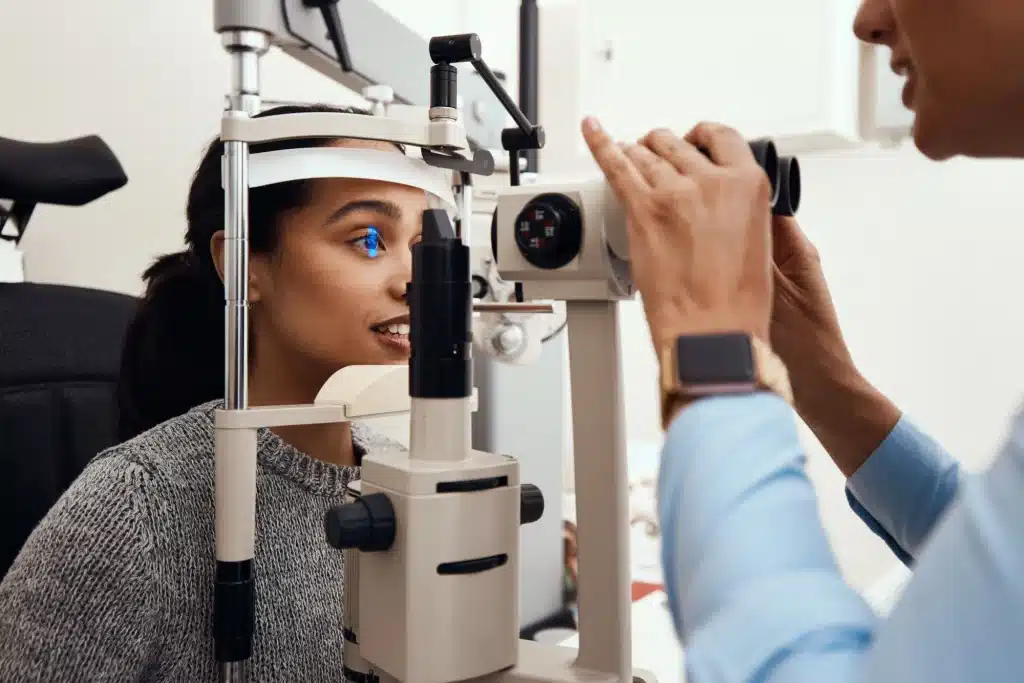Medically Reviewed by: Edward C. Wade, M.D., F.A.C.S.
What Causes Sudden Blurry Vision?
If you’ve recently noticed fuzzy or foggy vision in one or both of your eyes, you may find yourself wondering what causes sudden blurry vision and whether it could be a sign of something serious.
Blurry vision can have many causes, ranging from refractive errors like nearsightedness or farsightedness to more serious conditions like cataracts or even strokes. In some cases, sudden blurry vision can be a sign of an eye injury or infection. Trauma to the eye such as a blow to the head or face can cause blurred vision, and a scratched cornea may also lead to blurry vision.
There are countless causes of blurry vision, and it can feel overwhelming to try to determine what is causing yours. In this article, we’ll explore some of the most common causes, advise on how to get rid of blurry vision, and discuss when you should seek medical help.
Common causes of blurry vision
It’s important to seek medical attention as soon as possible if you experience sudden changes in your vision. Your doctor can identify the cause of your blurred vision and provide treatment options that will help restore your vision.
The most common causes of blurry vision include:
1. Refractive errors
The most common cause of blurred vision is refractive error, which occurs when the eye fails to focus light properly to produce a clear image on the retina. This can be caused by nearsightedness (myopia), farsightedness (hyperopia), or astigmatism. All three of these conditions can be corrected with eyeglasses, contact lenses, or refractive surgery.
2. Eye strain
Staring at a computer screen for long periods of time can cause eye strain and blurred vision. To reduce this type of blurry vision, give your eyes regular breaks from screens and make sure you’re following the 20-20-20 rule (every 20 minutes take a break for 20 seconds and look at something that is 20 feet away).
3. Presbyopia
As we age, our eyes may become less flexible and unable to focus on objects close up, resulting in blurriness when reading or doing other tasks requiring near vision.
Symptoms of presbyopia include:
- Difficulty reading
- Needing brighter lights to read
- Headaches after reading for long periods of time
- Holding books or other objects far away in order to focus on them
Reading glasses are often the best option to improve presbyopic blurry vision.
4. Cataracts
A cataract is a cloudy area in the lens of the eye that can cause blurry vision. Cataracts are more common as you age and typically require surgery to remove them and restore your vision.
Symptoms of cataracts include:
- Blurred, cloudy, or dim vision
- Difficulty seeing at night
- Glare from lights
- Double vision in one eye
- Fading or yellowing of colors
If you are looking for cataract surgery in Houston, you’ll want to make sure you are working with a trusted, experienced ophthalmologist.
Keep reading: What is the first sign of cataracts?
5. Diabetes or high blood sugar
Diabetic retinopathy is a complication of diabetes that damages the blood vessels in the back of your eyes, leading to reduced vision or even blindness if left untreated.
Symptoms of diabetic retinopathy include:
- Blurry vision
- Poor night vision
- Difficulty distinguishing colors
- Halos around lights
If you have diabetes, it’s important to make sure your blood sugar is controlled and to have regular comprehensive eye exams so that any retinopathy can be detected and treated early.
6. Angle-closure glaucoma
Angle-closure glaucoma is a type of glaucoma that occurs when the drainage angle in the eye becomes blocked, leading to a build-up of pressure in the eye. This pressure can cause blurred vision and, if left untreated, serious damage to the optic nerve.
Symptoms of angle-closure glaucoma:
- Blurred vision and/or blind spots
- Eye pain or redness
- Severe headache
- Nausea and vomiting
- Seeing halos around lights
Treatment typically involves prescription medications or laser surgery for glaucoma to reduce intraocular pressure. To know which course of treatment is right for you, schedule an appointment with a glaucoma specialist in Houston.
Continue reading: Why are my eyes red?
7. High blood pressure
High blood pressure can cause a condition called hypertensive retinopathy which can cause damage to the small vessels in the back of your eyes. This can lead to reduced vision or even blindness if left untreated.
Symptoms of hypertensive retinopathy include:
- Blurred vision
- Flashes of light in your peripheral vision
- Halos around lights
- Reduced peripheral vision
Managing high blood pressure through lifestyle changes and medications is the best way to reduce the risk of developing this condition.
8. Retinal detachment
This occurs when the retina separates from its attachment to the back of the eye, leading to blurred or distorted vision.
Symptoms of retinal detachment include:
- Flashes of light or floaters in your vision
- Blurry or distorted vision
- A “curtain” over part of your field of view
Surgery is often required to reattach the retina and restore vision so if you’re suffering from sudden blurry vision in one eye, you’ll want to make sure you contact a retina specialist in Houston immediately. If left untreated, retinal detachment can cause permanent vision loss.
9. Stroke
Sudden, acute vision changes can be a sign of a stroke, especially if you are only experiencing sudden blurry vision in one eye. Stroke symptoms are treatable if caught early on so if you’re experiencing any sudden blurry vision or other signs of a stroke, seek medical help right away.
Other symptoms of a stroke include:
- Slurred speech
- Difficulty speaking or understanding speech
- Weakness in the face, arms, or legs
- Loss of balance or coordination
- Numbness in the face, arm, or leg
10. Wet macular degeneration
Wet macular degeneration is an age-related condition that affects central vision. It is caused by abnormal blood vessels in the back of the eye that leak fluid and cause blurriness.
Symptoms of wet macular degeneration include:
- Blurred or distorted central vision
- Loss of color perception
- Difficulty seeing details
- Difficulty reading
Treatment for wet macular degeneration typically involves medication injections into the eye to help reduce fluid leakage and preserve vision. It’s important to seek medical attention as soon as possible if you experience sudden changes in your vision.
When to seek medical help for blurry vision from Eye Center of Texas
Now that we’ve covered what causes sudden blurry vision, it’s good to know when to seek help. If you notice sudden blurry vision in both eyes or one eye and find yourself searching for an answer to the question, “Why is my vision blurry all of a sudden?” it’s important to seek medical help right away. Depending on the underlying cause, treatment, lifestyle changes, or eyeglasses are usually necessary to preserve vision.
At Eye Center of Texas, our team of experienced ophthalmologists will work with you to diagnose the cause of your blurry vision and develop a personalized treatment plan to restore your vision. With six locations including offices in Houston, Pasadena, Sugar Land, Clear Lake, Katy, and The Woodlands, we are confident that we can offer you the care you need when you need it most.
To learn more about our options for clearer vision, schedule a consultation with us today.
More Helpful Articles by Eye Center of Texas:
- Choosing a Trusted LASIK Surgeon in Texas
- What Causes Cataracts and How to Fight Them
- What to Expect During EVO ICL Recovery
- Corneal Cross-Linking Success Rate
- Bifocal LASIK: Can LASIK Make You Bifocal?
Related Articles
Financing Options Available
Apply today to find a financing option that meets your needs.
Our Locations
Houston/Bellaire
6565 W. Loop S., Suite 650Bellaire, TX 77401
Medical Office:
713-797-1010
Medical Fax:
713-357-7276
LASIK/Near Vision:
Office: 713-395-1515
Fax: 713-357-7278
Pasadena
4415 Crenshaw RoadPasadena, TX 77504
Medical Office:
281-977-8800
Medical Fax:
281-977-8877
Sugar Land
15200 S.W. Freeway, Suite 130Sugar Land, TX 77478
Medical Office:
281-277-1010
Medical Fax:
281-277-4504
Clear Lake
455 E. Medical Center Blvd., Suite 110Webster, TX 77598
Medical Office:
281-332-1397
Medical Fax:
281-282-9152
Katy
Greenhouse Medical Plaza2051 Greenhouse Road, Suite 110
Houston, TX 77084
Medical Office:
346-547-7070
Medical Fax:
281-214-2971
The Woodlands/Conroe
100 Medical Center Blvd., Suite 118Conroe, TX 77304
Medical Office:
936-647-1610
Medical Fax:
936-647-1620


